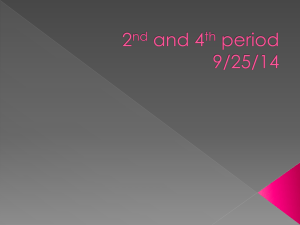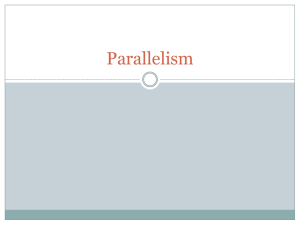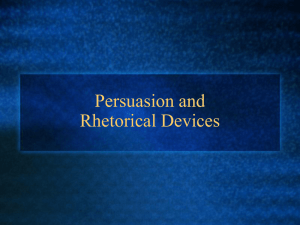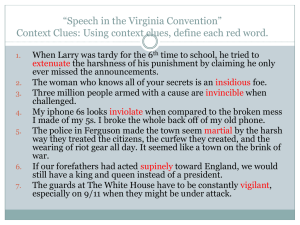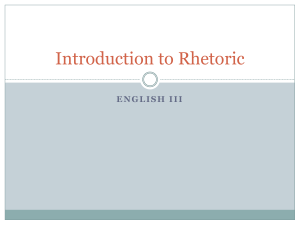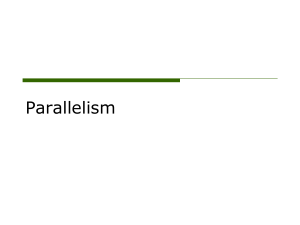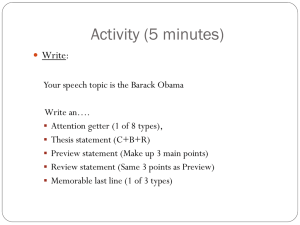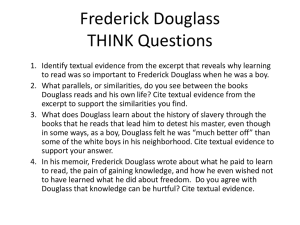A speech given at Rochester, New York, July 5, 1852
advertisement
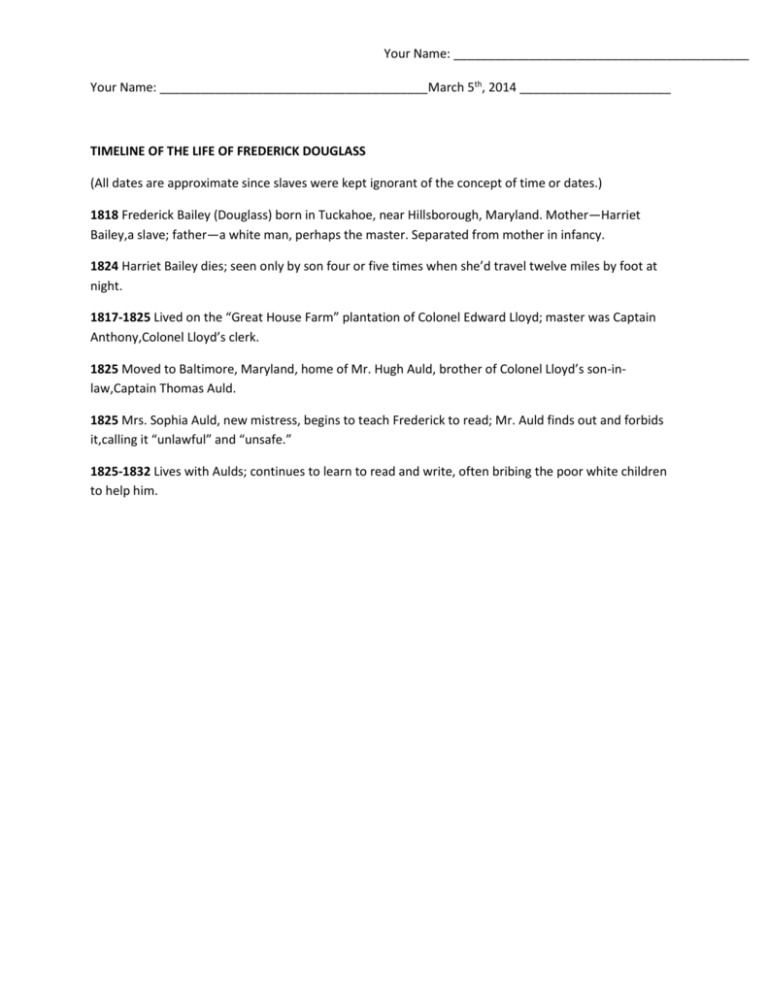
Your Name: ___________________________________________ Your Name: _______________________________________March 5th, 2014 ______________________ TIMELINE OF THE LIFE OF FREDERICK DOUGLASS (All dates are approximate since slaves were kept ignorant of the concept of time or dates.) 1818 Frederick Bailey (Douglass) born in Tuckahoe, near Hillsborough, Maryland. Mother—Harriet Bailey,a slave; father—a white man, perhaps the master. Separated from mother in infancy. 1824 Harriet Bailey dies; seen only by son four or five times when she’d travel twelve miles by foot at night. 1817-1825 Lived on the “Great House Farm” plantation of Colonel Edward Lloyd; master was Captain Anthony,Colonel Lloyd’s clerk. 1825 Moved to Baltimore, Maryland, home of Mr. Hugh Auld, brother of Colonel Lloyd’s son-inlaw,Captain Thomas Auld. 1825 Mrs. Sophia Auld, new mistress, begins to teach Frederick to read; Mr. Auld finds out and forbids it,calling it “unlawful” and “unsafe.” 1825-1832 Lives with Aulds; continues to learn to read and write, often bribing the poor white children to help him. Your Name: ___________________________________________ Parallelism, or parallel construction, occurs when a writer or speaker expresses ideas of equal worth with the same grammatical form. The statement, "Veni, vidi, vici," (I came, I saw, I conquered) by Julius Caesar is an example of parallelism. Similarity of structure in a pair or series of related words, phrases, or clauses. PARALLELISM: However, the following sentence does not use parallelism: "King Alfred tried to make clear laws that had precision and were equitable." "The bigger they are, the harder they fall." Or, as one student wrote, "Her purpose was to impress the ignorant, to perplex the dubious, and to startle the complacent." Shakespeare used this device to good effect in Richard II when King Richard laments his unfortunate position: I'll give my jewels for a set of beads, My gorgeous palace for a hermitage, My gay apparel for an almsman's gown, My figured goblets for a dish of wood . . . . (3.3.170-73) Antithetical Parallelism text analysis: rhetorical devices Rhetorical devices are structures within language that appeal to readers or listeners and communicate ideas. • A rhetorical question is a question to which no answer is expected. (But when shall we be stronger?) • Antithesis expresses contrasting ideas in parallel grammatical structures. (Give me liberty, or give me death!) • Repetition is the recurrence of words, phrases, or lines. (Let it come! I repeat it, sir, let it come!) • Parallelism is a kind of repetition in which words or phrases in the same grammatical form connect ideas. (Is life so dear, or peace so sweet . . .) • Biblical allusions are references to events, figures, or phrases Your Name: ___________________________________________ from the Bible. In this selection, they have the rhetorical appeal of shared beliefs. As you read Henry’s speech, be on the lookout for rhetorical devices and how they might have affected his audience 1. define: give a definition 2. find: get an example 3. “mine”: make your own example 4. refine: improve your definition with your additions; make it more subtle or accurate for YOU Your Name: ___________________________________________ Following are four rhetorical devices with their definitions and examples. These are intended to help you with the backside of the paper. Parallelism: Using the same grammatical structure for similar terms. When the writer establishes similar patterns of grammatical structure and length. Examples: "Ms. Stafford tried to make her instruction clear, precise, and equitable." This sentence has parallel structure in use of adjectives. “Democracy demands responsibility, whereas tyranny demands obedience.” This sentence has parallel construction with both the verbs – demands and nouns: tyranny and obedience. It is also an example of antithetical parallelism – see the next definition. Antithetical parallelism/Antithesis: when parallelism is used to juxtapose words, phrases, or clauses that contrast. Positioning contrasting elements next to each other can give a complete picture and emphasize the difference. Examples: “And so my fellow Americans, ask not, what your country can do for you. Ask what you can do for your country.” “When Neil Armstrong walked on the moon it might have been one small step for a man but it was one giant leap for mankind.” “Give me liberty, or give me death!” Asyndeton: The omission or absence of a conjunction between parts of a sentence; leaving out words to accelerate a rhythm. Examples: “Reduce. Reuse. Recycle.” "I came, I saw, I conquered”. This is an example of asyndeton because of the absence of conjunctions or “connections.” It’s also an example of parallelism with the verbs (came, saw, conquered). Extra unrelated notes: (Note that the period is outside the quotes because I’m quoting Shakespeare, a British author, and this Caesar is also using anaphora with the repetition of “I,” which I hope you remember from our poetry unit.) Rhetorical Question: A question that is not asked to secure an answer, but rather to move forward the development of an idea “Shall I compare thee to a summer’s day? Thou art more lovely…” There are those who are asking the devotees of civil rights, "When will you be satisfied?" We can never be satisfied as long as the Negro is the victim of the unspeakable horrors of police brutality. Your Name: ___________________________________________ Directions: After listening to Douglass’ speech, answer the following questions: 1) How would you summarize – to briefly state in your own words – the purpose and the tone of Frederick Douglass’ “The Meaning of July Fourth for the Negro”? 2) What was the most memorable part of the speech to you? Identify a line or section that had particular impact on you, and explain why you think it was impactful to you. 3) Using the definitions on the other side of this paper, and Douglass’ “What to the slave is the Fourth of July?” please define in your own words and provide a specific example of the following rhetorical devices. While you have the entire text of the speech on your iPads, I have highlighted the excerpt below for your convenience. What, to the American slave, is your 4th of July? I answer: a day that reveals to him, more than all other days in the year, the gross injustice and cruelty to which he is the constant victim. To him, your celebration is a sham; your boasted liberty, an unholy license; your national greatness, swelling vanity; your sounds of rejoicing are empty and heartless; your denunciations of tyrants, brass fronted impudence; your shouts of liberty and equality, hollow mockery; your prayers and hymns, your sermons and thanksgivings, with all your religious parade, and solemnity, are, to him, mere bombast, fraud, deception, impiety, and hypocrisy — a thin veil to cover up crimes which would disgrace a nation of savages. There is not a nation on the earth guilty of practices, more shocking and bloody, than are the people of these United States, at this very hour. Rhetorical Question: Parallelism: Antithetical parallelism: Asyndeton: Your Name: ___________________________________________ After listening to Douglass’ speech, answer the following questions: 4) How would you summarize – to briefly state in your own words – the purpose of Frederick Douglass’ “The Meaning of July Fourth for the Negro”? 5) What was the most memorable part of the speech to you? Identify a line or section that had particular impact on you, and explain why you think it was impactful to you. (Extra note to David Steege & Anyone Else Who is Tempted to Respond Creatively: “Nothing was memorable” is not an acceptable response.) 6) 7) Your Name: ___________________________________________ 8) The Meaning of July Fourth for the Negro by Frederick Douglass A speech given at Rochester, New York, July 5, 1852 Mr. President, Friends and Fellow Citizens: He who could address this audience without a quailing sensation, has stronger nerves than I have. I do not remember ever to have appeared as a speaker before any assembly more shrinkingly, nor with greater distrust of my ability, than I do this day. A feeling has crept over me quite unfavorable to the exercise of my limited powers of speech. The task before me is one which requires much previous thought and study for its proper performance. I know that apologies of this sort are generally considered flat and unmeaning. I trust, however, that mine will not be so considered. Should I seem at ease, my appearance would much misrepresent me. The little experience I have had in addressing public meetings, in country school houses, avails me nothing on the present occasion. Your Name: ___________________________________________ The papers and placards say that I am to deliver a Fourth of July Oration. This certainly sounds large, and out of the common way, for me. It is true that I have often had the privilege to speak in this beautiful Hall, and to address many who now honor me with their presence. But neither their familiar faces, nor the perfect gage I think I have of Corinthian Hall seems to free me from embarrassment. The fact is, ladies and gentlemen, the distance between this platform and the slave plantation, from which I escaped, is considerable-and the difficulties to he overcome in getting from the latter to the former are by no means slight. That I am here to-day is, to me, a matter of astonishment as well as of gratitude. You will not, therefore, be surprised, if in what I have to say I evince no elaborate preparation, nor grace my speech with any high sounding exordium. With little experience and with less learning, I have been able to throw my thoughts hastily and imperfectly together; and trusting to your patient and generous indulgence I will proceed to lay them before you. ------------------------------------------------------------------------------------------------
